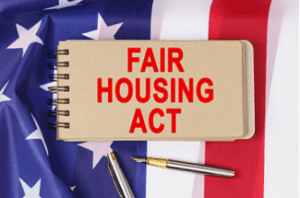3 Federal Laws Every Landlord Must Obey
Investing in multifamily housing is more than just purchasing a building, renting out apartments and collecting rent. There are many local, state and federal laws regarding landlord-tenant relations which every property-owner must follow. Since they are relevant to every rental tenancy, experienced, new and potential landlords should all familiarize themselves with rental laws.
Landlord-tenant laws govern the relationship, rights, rules and responsibilities of the parties to a residential rental agreement. Each of the 50 states have their own landlord tenant rights. When searching for state laws, be sure to look for them in the state where your property is located, not in the state where you live.
Federal Landlord-Tenant Laws

- The Fair Housing Act (Title VIII of the Civil Rights Act of 1968) prohibits housing discrimination due to race, color, national origin, religion, sex familial status or disability. The Fair Housing Act applies to all real estate transactions, including buying, renting, financing and selling property. It extends beyond leasing to include advertising and prevents landlords from marketing their properties to certain target groups of people.
The Department of Housing and Urban Development (HUD) is responsible for enforcing the Fair Housing Act (FHA). Under this act, landlords may not do any of the following actions based on race, color, national origin, religion, sex, familial status, or handicap:
- Refuse to negotiate rent or sell housing
- Make housing unavailable
- Deny a home
- Set different terms, conditions or privileges for sale or rental of a dwelling
- Provide different housing services or facilities
- Falsely deny that housing is available for inspection, sale, or rental
- Persuade owners to sell or rent for profit or
- Deny anyone access to or membership in a facility or service (such as a multiple listing service) related to the sale or rental of housing.
In Addition, it is illegal for anyone to:
- Threaten, coerce, intimidate or interfere with anyone exercising a fair housing right or assisting others who exercise that right
- Advertise or make any statement that indicates a limitation or preference based on race, color, national origin, religion, sex, familial status, or handicap. This prohibition against discriminatory advertising applies to single-family and owner-occupied housing that is otherwise exempt from the Fair Housing Act.
Need Legal Help?
Chat with a real estate lawyer near you. It’s only $5 for a 1-week trial. Ask unlimited questions.
The Fair Housing Act also protects rental applicants who have a physical or mental disability, including hearing, mobility and visual impairments, chronic alcoholism, chronic mental illness, AIDS, AIDS Related Complex and mental retardation that substantially limits one or more major life activities.
As a landlord, you may not refuse to make reasonable modifications to your dwelling or common use areas for the disabled person to use the housing. (Where reasonable, the landlord may permit changes only if the tenant agrees to restore the property to its original condition when they move.)
You are also not allowed to refuse to make reasonable accommodations in rules, policies, practices or services if necessary for the disabled person to use the housing.
- The Fair Credit Reporting Act (15 U.S.C. §§ 1681-1681x) dictates the ways in which a landlord may use a tenant’s credit history for screening purposes. It governs access to consumer credit report records and promotes accuracy, fairness, and the privacy of personal information assembled by Credit Reporting Agencies (CRAs). Its rules cover how a consumer’s credit information is obtained, how long it is kept, and how it is shared with others—including the consumers themselves.
CRAs compile what are called “consumer reports,” meaning any written, oral, or other communication of any information by a CRA bearing on a consumer’s credit worthiness, credit standing, credit capacity, character, general reputation, personal characteristics, or mode of living.
The Fair Credit Reporting Act (FCRA) describes the kind of data that credit bureaus are allowed to collect. That includes the person’s bill payment history, past loans and current debts. It may also include employment information, present and previous addresses, whether they have ever filed for bankruptcy or owe child support and any arrest record.
Under the Fair Credit Reporting Act (FCRA), a landlord must
- get an applicant’s permission to run a credit report,
- provide information on the credit reporting agency used, and
- inform the applicant if the information contained on the credit report was the basis for denial or adverse action.
Companies that provide information to consumer reporting agencies also have specific legal obligations, including the duty to investigate disputed information.
The Fair and Accurate Credit Transactions Act added many provisions to this Act, primarily relating to record accuracy and identity theft. Violations of the FCRA can carry fines, including damages if any are incurred. Many states also have their own laws relating to credit reporting.
- Americans with Disabilities Act The Americans with Disabilities Act (ADA) requires that individuals with disabilities have equal opportunity access to public areas. Apartment and rental properties fall under this category. However, compliance with accessibility standards isn’t required for dwelling units, just public spaces of an apartment complex or community.
However, the Fair Housing Amendments Act of 1988 requires seven design features to be incorporated into buildings that would allow units to be quickly adapted to meet accessibility guidelines. Required for structures built after March 13, 1988, the Fair Housing Act applies to all ground-floor units and units in buildings with elevators. To be compliant, these don’t necessarily have to be accessible; they just need to be adaptable.
The seven specific requirements to make units adaptable include:
- Accessible entrances
- Accessible public use areas
- Usable doors
- Access to and through a covered dwelling
- Reachable light switches, thermostats, and electrical outlets
- Reinforcements for walls, to accommodate grab bars
- Accessible kitchens and bathrooms
Under the Americans with Disabilities Act and the Fair Housing Act, landlords are not allowed to refuse service animals. The service animals must be licensed, registered, and vaccinated according to local laws. Housing providers are expected to allow these working animals as a “reasonable accommodation.”
State and Local Laws
In addition to following the three important federal rental laws, it is imperative that you familiarize yourself with the regulations covering landlord-tenant relations in your state and local community in order to prevent problems with your tenants.
For instance, the local laws where your rental is located may or may not protect you from injury claims should an event occur on your property that injures your tenants or one of their guests or you may have little to no recourse should your tenants damage your property, quit paying rent and refuse to move, or fail to keep up on agreed-upon maintenance.
Although landlord and tenant rights vary from state to state, most cover the following areas:
- Discrimination
- Lease terms
- Rent payment
- Security deposits
- Repairs and maintenance*
- Livable conditions
- Access to the property
- Eviction
In the end, it is best to get legal advice from an attorney who works in real estate law in your rental’s location to make sure that you understand your legal responsibilities. Furthermore, they can assist you in making sure you are as protected as can be possible.
*Most states have an Implied Warranty of Habitability. This requires a landlord to substantially comply with building and housing code standards and make repairs to the property as necessary.















 Accessibility
Accessibility